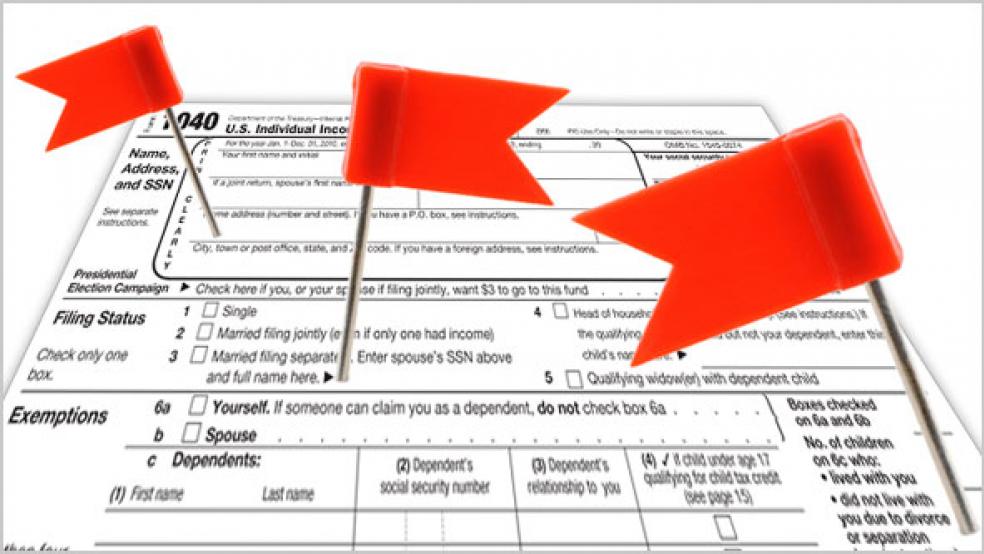Like getting attacked by a shark or being in a plane crash, being the subject of an IRS audit is one of those unlikely events that people tend to spend a lot of time worrying about.
For the vast majority of Americans, the likelihood of actually being audited is pretty slim. The IRS audits less than 1 percent of all tax returns, and the vast majority of those audits are “correspondence audits,” which simply involve answering a letter from the agency with either documentation or a check in response to a discrepancy.
Related: The Best and Worst States for Taxes in 2017
There may be even fewer IRS audits going forward, as budget cuts have hampered the agency. The IRS is down 5,000 revenue agents and criminal investigators since 2010. “The IRS is at a five-year low in staffing and in budget, and if you adjust that for inflation, its resource levels are very low compared with other government agencies,” says Mark Steber, chief tax officer at Jackson Hewitt Tax Service.
Still, the IRS considers audits vital to keeping taxpayers honest — and the inspections are also an important revenue source. Last year, the agency brought in $54 billion from “enforcement actions,” including audits, collections activities, results of appeals and programs that match documents such as W-2s.
Even if the odds of an individual being audited are low, the IRS did examine the returns of more than a million people last year. Returns are selected for further scrutiny via the computerized Discriminant Function System (DIF), which assigns a score to each return indicating its potential for questionable issues. A high score means that your return is more likely to get audited. While IRS hasn’t released details of what goes into that score, there are some known red flags that could trigger an audit:
Related: 8 Changes Coming to Your Taxes in 2017
1. You haven’t declared all of your income. While it’s unlikely that you’d forget to declare income on a W-2, if you’ve got multiple 1099s (forms that show income from interest or from freelance work), it’s possible one could fall through the cracks. But the companies that send you 1099s also send that information to the IRS. “The IRS is very good about document matching,” says Gil Charney, a director at the Tax Institute at H&R Block. “So you’ll get an inquiry on any income reported to it that’s not reported on your return.”
If it’s simply an oversight on your part, you can usually just write a check for the taxes you missed to clear up the matter quickly.
2. You make more than $1 million a year. Americans earning $500,000 to $1 million per year are more than three times as likely to be audited than those earning $75,000 to $100,000. One in three Americans earning more than $10 million a year will be audited.
3. You’re self-employed. Since there’s no employer to corroborate your revenues and expenses, it’s easier to take some latitude with your financials — and there’s more room for mistakes on your return. If you have a business that shows losses in consecutive years and a W-2 showing other income, that could trigger an audit, since the IRS may think that you’re trying to claim a hobby as a business.
Related: Self-employed? Here’s How to Save for Retirement
“If you’re not actively out there trying to make money, and it’s clear that you’re living off of some other income, you’re setting yourself up for trouble,” says Annette Nellen, professor of accountancy and taxation at San Jose State University. “You have to give it a careful look to see whether it truly qualifies as a business.”
4. You didn’t reconcile your income with your ACA subsidy. If you used subsidies to help pay for insurance purchased through the Obamacare exchanges, you had to estimate your 2016 income to find out the size of the subsidy you’d receive. Now that the year is over, you need to file a Form 8692 confirming or correcting that income. If you earned more than expected, you may need to pay back some of the subsidy, and if you earned less, you may be entitled to a larger subsidy.
You’ll also need to file a 1095-A to show that you purchased insurance (those who get coverage from their employers will need a 1095-B). If you didn’t have health insurance, you’ll owe a penalty of $695 or 2.5 percent of your income, whichever is higher.
Related: How Obamacare Repeal Could Hurt Retirees on Medicare
5. You have a foreign bank account. The IRS has taken a growing interest in recent years in making sure that Americans can’t hide income by having it deposited in bank accounts overseas. While you won’t receive a 1099 for income earned from foreign bank accounts, you may still have to report it. If you have more than $10,000 in an overseas account, you’ll need to file a Report of Foreign Bank and Financial Accounts (FBAR) with the IRS.
The tax agency has increased relationships with foreign governments and banks to gain access to more offshore accounts. Those efforts helped bring in $10 billion in unpaid taxes since 2009 , so it’s likely an area on which the IRS will continue to focus.
6. You’ve taken a large charitable deduction. The IRS is particularly on the lookout for deductions that are larger than usual relative to a filer’s income. Be prepared to show proof of any donation that you make. For cash contributions below $250, you’ll need a receipt or bank record such as a cancelled check or credit card statement showing the donation. Gifts over $250 require a letter from the charity stating the total amount given and specifying that you didn’t receive goods or services in exchange for the donation. Non-cash contributions also require a written acknowledgement from the charity, and those worth more than $5,000 need a third-party appraisal.





